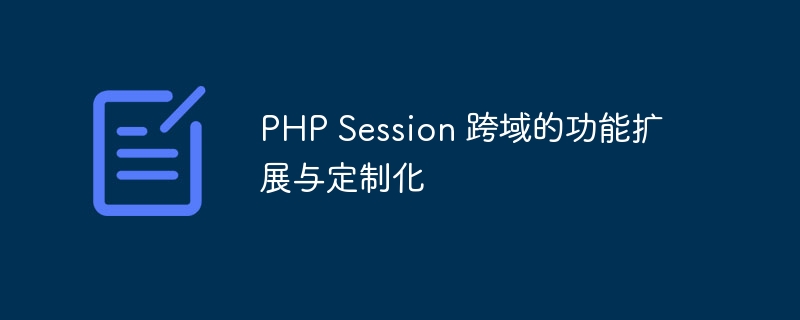

PHP Session cross-domain function expansion and customization
Introduction:
PHP is a commonly used server-side scripting language used to develop dynamic websites and Web application. In PHP, Session is a mechanism for sharing data between different pages. However, the default functionality of Session may be limited when there are cross-origin requests. This article will introduce how to extend and customize the functions of PHP Session to meet the needs of cross-domain requests, and provide specific code examples.
1. The problem of cross-domain requests
In web development, cross-domain requests refer to network requests between different sources (domain names, ports or protocols). Due to browser origin policy restrictions, cross-domain requests are generally prohibited. In the scenario of cross-domain requests, data sharing cannot be achieved using the default functions of Session, which requires functional expansion and customization of PHP Session.
2. Solution to cross-domain requests
In order to solve the problem of cross-domain requests, one of the following two solutions can be used:
<script> tags and callback functions to implement cross-domain requests. When the client initiates a request, the callback function name is passed to the server as a request parameter. The server encapsulates the data in a function call and returns it, and uses JavaScript to dynamically execute the function to obtain the data and process it. In this way, cross-domain data transmission is achieved between the server and the client. The specific implementation code is as follows:
// 服务器端(被请求的页面)
$data = array('name' => 'John', 'age' => 25);
$callback = $_GET['callback'];
$response = $callback . '(' . json_encode($data) . ')';
echo $response;<!-- 客户端 -->
<script>
function callback(data) {
console.log(data.name); // 输出 'John'
console.log(data.age); // 输出 25
}
var script = document.createElement('script');
script.src = 'http://example.com/api?callback=callback';
document.getElementsByTagName('head')[0].appendChild(script);
</script>The specific implementation code is as follows:
// 服务器端
header('Access-Control-Allow-Origin: http://example.com');
header('Content-Type: application/json');
$data = array('name' => 'John', 'age' => 25);
echo json_encode($data);<!-- 客户端 -->
<script>
fetch('http://example.com/api')
.then(response => response.json())
.then(data => {
console.log(data.name); // 输出 'John'
console.log(data.age); // 输出 25
});
</script>3. Expansion and customization of PHP Session
In addition to solving the problem of cross-domain requests, PHP Session can also be extended and customized. , to meet more specific needs. The following lists some common extension and customization scenarios:
4. Summary
In the scenario of cross-domain requests, the default functions of PHP Session may be restricted. By using JSONP or CORS to solve the problem of cross-domain requests, cross-domain transmission and sharing of data can be achieved. At the same time, the functions of PHP Session can be extended and customized to meet more specific needs. Through an in-depth understanding and flexible use of PHP Session, the development efficiency and functionality of web applications can be improved.
The above is an introduction to the cross-domain functional expansion and customization of PHP Session, and provides specific code examples. I hope it will be helpful to readers in actual development.
The above is the detailed content of PHP Session cross-domain function expansion and customization. For more information, please follow other related articles on the PHP Chinese website!
 Reasons for session failure
Reasons for session failure
 Session failure solution
Session failure solution
 The difference between lightweight application servers and cloud servers
The difference between lightweight application servers and cloud servers
 The difference between master and host
The difference between master and host
 What to do if the Chinese socket is garbled?
What to do if the Chinese socket is garbled?
 How to completely delete mongodb if the installation fails
How to completely delete mongodb if the installation fails
 How to implement color fonts in css
How to implement color fonts in css
 java configure jdk environment variables
java configure jdk environment variables




